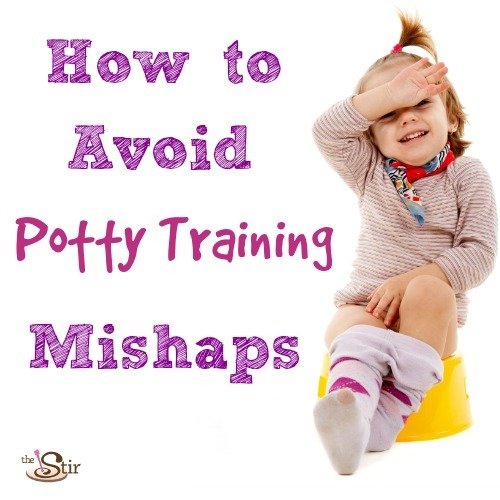Potty training is the D day of toddlerhood: Moms venture forth, fearing the worst, while their little ones leave a trail of damage in their wake. Only it doesn't have to be a long, drawn-out horror story, says Heather Criswell, who's potty trained hundreds of kids and is the founder of RaiseaHappyChild.com. On the contrary, "Potty training can actually be a breeze and take as little as three days to a week, tops," she says. The key is to avoid some common potty training mistakes that throw a wrench in the process. Make sure to steer clear of these misguided methods, and try these smart fix-its instead:

Mistake #1: Pushing kids before they're ready. "The term 'toilet training' should be banned, as you cannot literally 'train' a child to use the toilet," says Ann Corwin, PhD, at TheParentingDoctor.com. A child's desire to graduate out of diapers is a developmental milestone, and just in the same way you wouldn't push kids to walk, you can't push them to potty train before they're ready — and if you do jump the gun, you will fail. "The biggest mistakes parents make in potty training are related to not understanding the basic principles that the child must first be able to control their potty functions, and then has to want to," says Charles Shubin, MD, director of pediatrics at the Family Health Centers of Baltimore. "This latter step is the least understood, but without both parts there, the child can't be potty trained."
Quick Fix: Make sure your child is already expressing an interest in going on the potty before you coax him along. "Two signs to look for are that he's interested and uncomfortable," says Criswell. "By interest, I mean he follows you into the bathroom to watch you pee and flush. And by uncomfortable I mean he dislikes wearing a dirty diaper and asks through his actions or words to have it changed."
Mistake #2: Not waiting until YOU are ready. "If you are not interested in waking up at 2 a.m. to change the sheets, clean the rugs where the urine is soaking in, clean poop off of everything, and do five loads of laundry a day, well, you might want to wait to potty train," says Criswell. The reason: Potty training is a messy, time-consuming commitment, so you need all hands on deck. If a busy work project is breathing down your neck, you may be tempted to ditch potty training halfway through and fall back into diaper mode. Only this is confusing to kids, and will make the road to success a much more prolonged, stop-and-start process.
Quick Fix: Choose a potty-training time when you won't have many other pressing responsibilities, like over Christmas or spring break, or a long weekend at least. That way, you can hunker down at home and devote your undivided attention to the task.
Mistake #3: Switching back to diapers at bedtime, on long drives, or other moments when it's just easier. "Often parents want to potty train until bedtime, when they often resort back to diapers or pull-ups," says Criswell. "But when we switch back and forth, the child loses the experience of being wet/pooped on/uncomfortable and is getting mixed messages." Same goes for inconvenient times like long road trips or family events like weddings. While it's tempting to go back to diapers, consistency matters. "When the panties go on, it's forever," says Criswell. "At least until you're in your 80s!"
Quick Fix: Skip the diapers or pull-ups at bedtime and get a few plastic mattress liners instead. Avoid planning potty training around big social events or when you travel, or if you must, pack plenty of extra outfits to whip out in case of accidents, and take your child to the bathroom hourly to keep such calamities at bay.
Mistake #4: Using regular underwear. We know your kid's probably excited to wear "big kid" underwear sporting Dora or Batman … only problem is the material is so thin that your child's accidents will go right through them and rain a puddle into his shoes.
Quick Fix: "Get thick training underwear," advises Criswell. "We want them to feel the sensation of urine, but we want to avoid flooding our house. Have six to nine sets ready to go; you will need them."
Mistake #5: Giving out stickers, M&M's, or other rewards. "I have never been a fan of giving rewards, but especially when we are doing something that is not necessarily amazing," says Criswell. "It's just a natural part of life." Here's what can go wrong with rewards for every trip to the john: Your kid may decide to work the system by going to the bathroom every five minutes. Or the day you don't have a candy handy, he'll throw a fit, feel gypped, then regress to peeing in his pants out of spite. All in all it opens the door to tons of drama and a more protracted process.Quick Fix: Praise your kid when he uses the potty by saying, "Good job!" or "Thank you for using the potty." "Children are naturally excited and proud of using the bathroom on their own," Criswell points out. "Our job is to cheer them on."
Mistake #6: Not keeping an eye out for signals. Kids won't just come up and say, "Time to go to the potty!" The signs are much more subtle. "One of the most common mistakes is for the parent to not follow through when the child gives the signal," says Wanda Draper, PhD, author of Your Child Is Smarter Than You Think! Every child's "signal" is different, although it often assumes the form of a squat, dance, or holding of the genital area. Whatever his signal is, they can be easy to miss if you're distracted, busy, or just not aware of what it is — and if you don't know your kid's little "butt wiggle" means he's gotta go, how will he? It's your job as a parent to teach your child to tune in to the signs and head to the bathroom when they crop up.
Quick Fix: First, pinpoint the signs your child displays when he's gotta go. Then watch for them like a hawk and, once you spot them, take your child to the bathroom and set your child on the toilet. "After several times, the child will make the association between the urge to go and the toilet and will naturally go there," says Draper.
More from The Stir: When a Potty-Trained Kid Has Accidents: 12 Dos & Don'ts
Mistake #7: Getting upset over accidents. A no-brainer, of course, but easier said than done. "Shaming a child for accidents can bring about fear of humiliation," warns Draper. This fear, in turn, may convince the child to hold it in even when he is seated on a toilet … which defeats the purposes of potty training and turns it into a much more emotional ordeal for all involved.__
Quick Fix:__ Simply say, "Accidents happen! It's not a problem. Just try to remember to go to the potty sooner next time, okay?"
Got any potty training tips (or mistakes) to share?
*Image © Vladimir Godnik/fstop/Corbis; © iStock.com/vgajic *




